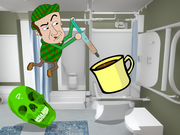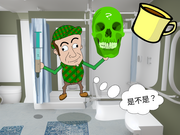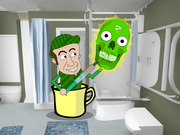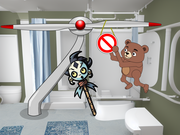是可忍,孰不可忍
Characters and words in 是可忍,孰不可忍
to be (followed by substantives only) / correct; right; true / (respectful acknowledgement of a command) very well / (adverb for emphatic assertion)
是
=
旦
+
龰
:
Mnemonic symbol: a skull, from "to be or not to be".
Sherlock Holmes (sh) starts his day in the space station's bathroom (Ø4) with a mug of coffee (旦). Holding a skull (mnemonic symbol for 是) in his hands, he asks himself "to be, or not to be" (是). He wonders if he can make the skull come back to life using lots of coffee, and injects coffee from his mug into the skull using a syringe (龰).
Sherlock Holmes (sh) starts his day in the space station's bathroom (Ø4) with a mug of coffee (旦). Holding a skull (mnemonic symbol for 是) in his hands, he asks himself "to be, or not to be" (是). He wonders if he can make the skull come back to life using lots of coffee, and injects coffee from his mug into the skull using a syringe (龰).
是
=
日
+
下
+
人
:
Mnemonic symbol: a skull, from "to be or not to be".
Sherlock Holmes (sh) watches the Neanderthal Man (人) trying to climb to the sun (日) on a ladder (下) in the space station's bathroom (Ø4). Sherlock is afraid that he'll open the window, so he puts on a big skull (是) and scares him off.
Sherlock Holmes (sh) watches the Neanderthal Man (人) trying to climb to the sun (日) on a ladder (下) in the space station's bathroom (Ø4). Sherlock is afraid that he'll open the window, so he puts on a big skull (是) and scares him off.
can / may / able to / to approve / to permit / to suit / (particle used for emphasis) certainly / very
可
=
丁
+
口
:
Alternative mnemonic symbol: kebab, from the pronunciation "ke". Karl Marx (k) is preparing a kebab (mnemonic symbol for 可) in the elevator's living room (e3). He also skewers mandarins (口) on the long steel nails (丁) and will only allow (可) his guests to eat the rest of the kebab if they eat their mandarins first.
who / which / what
Words with 是可忍,孰不可忍
是可忍,孰不可忍
is not used as a component in another word.
Sentences with 是可忍,孰不可忍
是可忍,孰不可忍 currently does not appear in any sentence.





